#at this point i could just make my own artbook if we don't get one from takei
Text

My other piece for @mankinzine and another collab with Mage @sakuranoumi!
You can read the fic that was inspired by this pic here.
#shaman king#shaman king flowers#hana#yohane#alumi#art#give me a chance to draw skf and i will do it without hesitation#at this point i could just make my own artbook if we don't get one from takei
73 notes
·
View notes
Text
Well, might as well inaugurate this blog with something pretentious and philosophical.
Oh, by the way, if I ever misgender Aspen in this post, please do correct me. Although I've been speaking English fluently for years, my framework of reference is a language with no gender neutral pronouns, so I'm used to dumping people into categories. Do inform me and I will correct it ASAP.
MetaWare High School (Demo), and my paradox with mortality.
So let me start this by saying this is sort of a compilation of my thoughts on a game I recently played. If you haven't played MetaWare, I implore you to do so right now. It's definitely not the zenith of fictional media, and there's a load of things about it that I would have done differently, but it's a great game and one that you only really get to experience once. It's one of the most emotional experiences I've had in a while, as much as I hate describing things as "experiences" (or, for that matter and for those who don't know me that well, as "content"), and if you're the kind of person who it hits for, then it probably really really hits.
That being said, the basic premise of the game is that it's an incomplete visual novel in which every single character is aware not only of their own incompleteness, but also of their own fictional reality. They're aware that their existances sort of revolve around the player, and some of them even believe (or rather, are aware) that the arrival of said player will ultimately lead to their demise. The game on a superficial level feels like smiling on the face of an unbelievably bleak prospect, with most of the characters appearing to attempt maintaining a grip on reality, a reality that they cannot comprehend and which may very soon be gone, forever. And that theme in particular is what really stood out to me as my main contextualisation of the game, through the lens of my own life: living in an incomprehensible reality that seems cruel and strange and sometimes manipulative and repetitive, that at the whims of someone else could be cut short at any point in time, and how I've come to reason through it.
MetaWare High School is a game about a lot of things. It's about metafiction, which is frankly is the least appealing of its ideas to me, but which even then still shines among the heaps of worse uses of metafiction all across stories everywhere. It's about existentialism, about how we come to cope with reality, about free will, about how absolutely adorable it would be to feed your homosexual edgelord doomer girlfriend gummy bears. To me, however, to the great SerenaOculis and her history and context and general life, it's a game about the ultimate injustice.
To me, MetaWare is a game about death.
There's one particular thought experiment I'd like those who have played the game to make. If you were to replace "We are aware that we are fictional characters" with "We are roughly aware of the circumstances that will surround our death", would the story of the game really change that much? To me, the answer seems sort of obvious: No. These characters and their ficticiousness just mirror our perishability and absolutely diminute scale in a world that is real. According to the artbook, I've been told, every character is modelled around an "ideology" or concept of some sort. I am not going to discuss the accuracy of these portrayals: it is sort of obvious Nari is much more of a fatalist than a nihilist, and Aspen being associated with anarchy is honestly kind of confusing to me... But examining their points of view from what I can assume the author thought these concepts were like, it does feel like they strongly influence the way each character behaves upon realising the sheer crushing weight of their situation. Isadora freaks out, Aspen attempts to do everything they can, Hope resorts, as always, to looking for pleasure, Chris finds a certain level of redemption and hope in the finality of her position, and Nari does... Nothing. Nari does not care about her life or surroundings anymore. She does not care about her friends, or her world, and if she does she is utterly unable to spare enough energy to show it in any meaningful way, except for moments before her death.
I may be biased against her, mostly due to personal conflicts in ideology. But I believe Nari, and the way she copes with her reality, have failed. However, due to my interactions and experience with people like her and thoughts like hers, I believe she has every right to feel the way she does. Even if the way she's depicted may come across as unnecessarily edgy or trying too hard at times, even then, she still has a right to. Being relegated to a seemingly pointless existence of endings and loops and final death, one I have personally found myself stuck in too, does things to a person. It breaks them. The ultimate unfairness and meaninglessness of absolutely everything is a crushing prospect, and I can't deny that every single one of the best people I've ever met has been completely and utterly ravaged under its weight. Mortality does shit to people. Shit that, and you the reader may disagree with me on this, is completely unfair, gratuitous, and cruel. And while Nari's reaction doesn't help her find some shade to cover herself from this burning, red sunlight, it is absolutely justified.
Every other character encounters solace somewhere else. Chris, on some level, accepts her ultimate purpose as the ability to enrich the player, in some way. Aspen simply accepts things as they come, and finds solace in their own inner peace. Isadora... Well, Isadora doesn't find peace at all. It's kind of sad, actually. She freaks out a lot about everything and gets really jumpy with the prospect of the end. Which is, again, understandable. And Hope, on some level, reaches tranquility, but is still quite scared about the possible outcome or implications of her end. The end scene happens, the characters say their last few lines, and they're gone.
I am still kind of dealing with this ending. I understand that it's a fictional story, and it definitely doesn't hit me as hard as the death of a flesh being, but I still believe I caught a pretty bad case of [S] GAME OVER disease from it. These are characters deliberately designed to be people who deserved better, and my arrival to their world, their inception, also meant their departure from mine. The endless spawn of entropy eating every last part of their world, to dissapear and never be thought of again. On to the next thing. And that's the thing with MetaWare.
Because, this is going to happen to me too.
And if it does while I'm young, I need to accept it.
MetaWare got me introspective about my current measures towards death: it made me study myself to figure out how I really think. And I believe I have found a paradox, or rather, a circle, within my reasoning. An ouroboros of mortality, if you will, except we're not calling it that because Mothlass bullies me enough for constantly referencing whatever mythological concept I found about this week in Wikipedia already.
To me, death is not terror-inducing, in the same way that countless atrocities of history aren't that... Scary. Because it's not scary. It's tragic, and unfair. It's a tragedy so mundane that every reasoning being on this planet spends large portions of their time trying to bullshit themselves into thinking it's fine. Possibly, even beyond this planet. I'd have no way of knowing, though.
However, at the same time, it's not like I'm going to be the one to find the perfect solution to mortality complete with no drawbacks and free ice cream and everything. Much less entropy. It feels like you kind of have to cheat the laws of thermodynamics to fix that one. So, what can I do?
Well, I've come to this solution.
If I was a fictional character, if my words were on a script and my life determined by someone I'll never truly know getting me to act ways I don't truly have a say in?
I'd still do my best, as I always have. Tomorrow will be better only if we make it be, after all, and I can't make anything better if I'm too busy getting pissed about things that I absolutely have a right to be completely wrathful about but which I'm also not going to fix by causing harm to myself. I'd be the best person I can be, going out with the main character or not, having my game uninstalled or not, dying or not, because hope and progress and the betterment of things are what truly brings me joy and tranquility. I'll make things that, even if not indestructible, will still be meaningful to someone for at least a few days after I die, and as long as my memory outlives me, I would have won.
To Chris, Aspen, Izzy, Hope and Nari, to my fictional friends with scripted lines and an unfairly short lapse of time to live, thank you. Thank you for getting me to think about myself. You are not alone in your struggles, and I find myself having to reason through the same things as you. And, most importantly, a whole day has passed ever since I heard your last words. You guys won.
And just like the five of you,
I shall win too.
-SerenaOculis, Eye on the Sky.
P.D.: Shoutouts to the person who got me to play this game. You know who you are. You should also know that you're a really nice person too. :)
14 notes
·
View notes
Text
On Trauma, Alienation, and Yuri Petrov
After the anon I recieved yesterday got me thinking about Yuri's lack of support system as well as had me coming back to this one scene in the Rising where Kotetsu tells Yuri that he could never understand what Barnaby went through. This will be a bit of a ramble so bear with me!
As he's meant to be a foil for Barnaby I feel like most of the attention goes to Barnaby and his trauma when making a comparison between the two (which is fair, he's a main character after all). Because of this some people don't really see the depth behind Yuri and the realism to his trauma. Some have written him off as part of the "abused people become abusers" stereotype or outright dismissed him as some egotistical man child of a villain. I think it's important to take a look at him and how his multiple traumas, and the alienation he faced thereafter, lead him down the path he's on by focusing on his side of the comparison.
To start with, one notable point is that Barnaby is able to reveal his trauma on live television and have the entire city rally around him. His support system and the people who have his back extends further than just the people he knows.
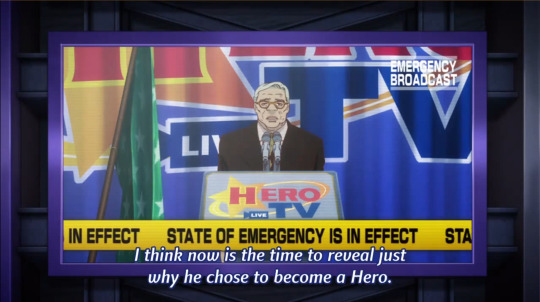
Yuri, on the other hand, can't reliably even talk to his own mother (the only person he's shown to have any type of connection to) about what he's been through as her responses seem unpredictable. We can make the reasonable assumption that he doesn't have any friends because it states in the translated hero schedules that nobody has his phone number.
As a judge he can't admit to murder, as the son of the most highly regarded and beloved hero he can't speak ill of him (he likely wouldn't be believed anyway), and as someone who is seemingly still full of guilt and questioning his own behavior (no doubt aided by the fact that even his mother, who he was trying to save, doesn't always support him) he can't easily admit to the aftermath either.
Continuing with the focus on his portrayal in the Rising, I'll point out again (as I did in my response yesterday) that there is a particularly interesting scenario where we get to see the aftermath of the effects of trauma relating to loss of a parent in three people at once. One desperate for revenge and one who has technically gotten his revenge yet didn't feel any better because of it.

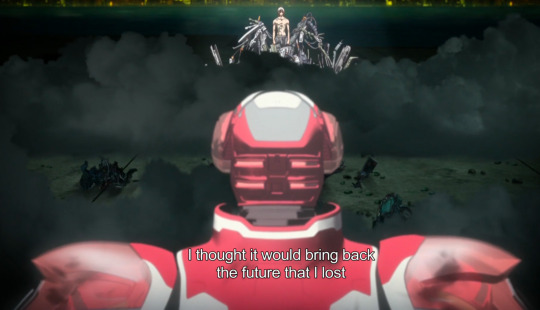
"Now wait a moment." You may be saying "Yuri killed his own father so isn't that different than the other two?" and to that I would like to posit that Yuri did have his father taken from him before he ever killed him.
Aside from his hatred of "evil", Yuri also seems to view heroes as immoral, fame driven, and unable to help those in need. I think a lot of this can be tied back to the fact that Yuri lost his father as he knew him the moment the abuse started.
Child Yuri seemed amazed by his father, right down to the Legend themed outfit. It can be assumed he was a great dad and a great hero at this point. However, that image was shattered when Legend began to drink and abuse his family (as an aside, one of the artbooks confirmed that Yuri was beaten as well). The man he looked up to, the hero, the man who taught him to never let evil go unpunished, was hurting him. It's not difficult to image what that sort of effect dissonance could have on a child.
Legend was staging his arrests and trying desperately to hold on to what he had, putting the anger he felt at losing his position over his duty as a husband and father to be there for his family (I could contrast this with how Kotetsu, in the same situation, uses this time to get closer to his family but that's for another time). He was loved and admired by all with no one any wiser to what happened behind closed doors.

I think it's because of this that Yuri seems to live his life in opposition to the hero lifestyle. In a way this could almost be seen as a form of revenge seeking against heroes themselves. He's seen what a "hero" can be like and he can no longer trust them to make the right choices or have a genuine desire to help anyone so he takes it into his own hands and has no qualms about airing his spiteful opinions while doing so.
As a side note, in a way I also believe that his decision to kill those that are evil is, in part, a form of reassurance to himself that he's not wrong for what he did to his own father. We kind of get a hint of that in the scene where he's hallucinating and yells at his father's apparition after having his actions questioned by him.


To return to the main point, Yuri isn't really given the opportunities the others had to change their ways and heal. There was no one there to stop him from going down the wrong path. Barnaby tells Virgil that he's not out to save Schneider, he's out to save Virgil himself. Barnaby also says how Kotetsu was able to be there for him and that, had it not been for him, he wouldn't even have been standing there today and would have gone down the wrong path himself.
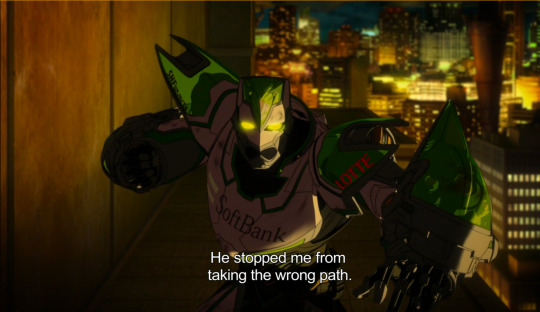
I often see people discuss what Yuri might have been like had he never been abused or killed his father but I think a more interesting thing to consider is what he could have been like had he had someone on his side when he really needed it, if he didn't live in a world that would likely turn on him if he spoke against the most well-known celebrity hero (I would imagine that, much like in our real world, if an abuse victim spoke out against a celebrity they'd be shamed and called a liar), if there had been someone there to set him straight before his pain and twisted morals consumed him.
Even as we see him in the show I don't think he's a bad man. He does terrible things, yes, but he does them out of a desire to save people, to help others, to prevent more suffering. It annoys me to see him portrayed as some childish villain just stupidly killing for the sake of it. He's misguided, yes, but there's a method to his madness.
I guess the main point is that, regardless of how Kotetsu meant it, I feel sad thinking about Yuri stating his views on how to heal from the past only to be told that he "Doesn't know the first thing about what [Barnaby's] been through". Yuri does know pain, loss, and betrayal quite well which is how he came to those conclusions in the first place, he just hasn't been in a situation that's allowed him to admit and process that.


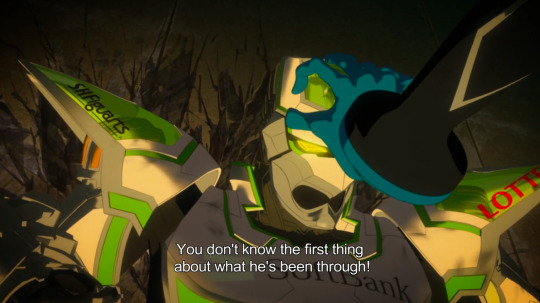
103 notes
·
View notes
Text
Guilty Gear Xrd Sign, minor fluff lost in translation
I've fallen into a Guilty Gear rabbit hole lately and I can't help but notice some minor things lost in translation. Being bugged by how no one seems to be pointing it out, I've decided to make a post about it.
3 tidbits about Sol, Ky, and their relationship conversation bits that didn't clear the translation barrier in one piece.
PS. Things get lost in translation all the time since no two languages are completely the same, which is perfectly ok! I will also try not to nitpick too much, no point in it.
Come one come all it's canonical SolKy or KySol food.
1. Overall tone. This portion has a good sprinkling of my opinion so keep it in mind as you read through.
Overall there's a difference in JP Sol and EN Sol in Xrd Sign and to some extent Xrd Rev2. Sol doesn't snark in JP as much, EN plays this up slightly. JP Sol is largely sarcastic and dismissive (lesser extent towards Ky and Sin), mostly similar to EN. I suspect the extra snark is to play up his assholish American traits since he's clearly written to be that way originally, lol.
Ky is well handled in comparison in EN. I don't have much to say about his character. His speech is very much in keigo and overall not too much was added nor taken away.
2. Example of extra snark and... Sol having high blood pressure.
Chapter 2, Struggle A (Link to transcript)
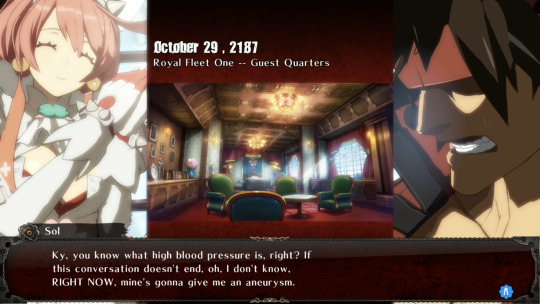
[EN] Sol: Ky, you know what high blood pressure is, right? If this conversation doesn't end, oh, I don't know, RIGHT NOW, mine's gonna give me an aneurysm.

[JP] Sol: Ky, you know I DO have high blood pressure? If this conversation doesn't end in 5 minutes I'm going to drop dead from being pissed off.
In JP, this line is phrased as カイ、テメェは俺が高血圧だと知っているな?, where it implies more that Ky should know Sol actually has hypertension... And while the English has retained it somewhat, the way it's worded makes it sound more like something a person would lie about just to be extra mean.
So I guess Sol has hypertension in canon.
3. Ky cares a great deal about Sol. +Sol doesn't call Ky a kid and does not treat him like one, but rather a familiar stranger in the start of Xrd Sign.
In Chapter 4 Part B (Link to transcript)
[EN] Ky: It is not! Yes, he took away some of what makes you human, but that doesn't mean he altered your mind or your soul.
[EN] Sol: So what?
[EN] Ky: I want to believe that you'll fight for the people of this world.
[EN] Sol: Are we seriously having this conversation?
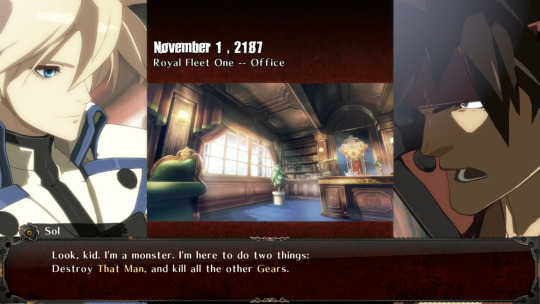
[EN] Sol: Look, kid. I'm a monster. I'm here to do two things: Destroy That Man, and kill all the other Gears.
This is a slight nitpick because in context Sol isn't talking down to Ky, but putting his view into place juxtaposed to his. The EN isn't wrong to use “kid”, but messes up a potentially important bit -- that Sol does not see Ky as a naive boy anymore.
At no point in JP does he call Ky "boy" 坊や or "kid" 小僧, it seems like Ky has officially graduated from that nickname as of Overture. I've ran through a disgusting amount of lines (not all! so busy and idk how to find the short stories from the artbooks. T_T) and could not find any trace of that nickname in JP anywhere from Xrd onwards. Plus, Sol doesn't talk down to Ky in JP - in fact he seems to regard Ky as a familiar stranger more than anything else.
Sol: Not too different from the Valentines in that sense. Now if you've got it in your head that we're gonna be best pals, rethink that. I've got my own shit to take care of.
The conversation goes on a little, until this part which would make anyone's heart melt a bit.

[EN] Ky: If tomorrow promises to be cold and dark, I cannot stand idly by...even if I know my efforts will come to nothing.
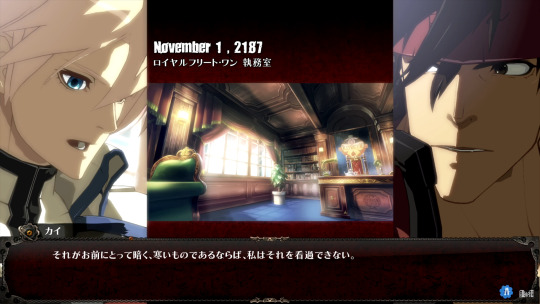
[JP] Ky: If your tomorrow promises to be cold and dark, then I cannot remain a bystander and watch.
In JP Ky explicitly says "your tomorrow". Not everyone's, not humanity's, but Sol's tomorrow. Humanity's tomorrow is important, yes, but right now in this scene, Ky cares a great deal about Sol.
Sol, shocked for a moment, returns this.

[EN] Sol: ...The self-righteous apple doesn't fall far from the tree.
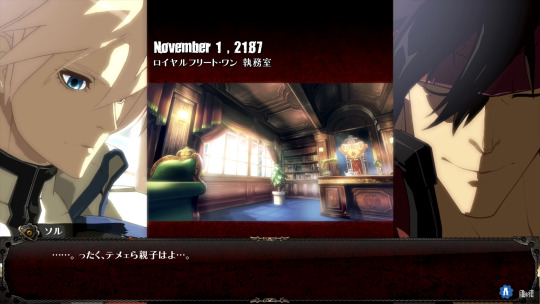
[JP] Sol: .... Jeez. Both the father and his son...
I think the localized result is more viable, since you can't really chuck a line like mine into a localized game. It's awkward English. But I do think it's kind of a missed opportunity when Sol says it softly and doesn't rag on their sense of justice, but rather their attachment towards him that he can't shake off.
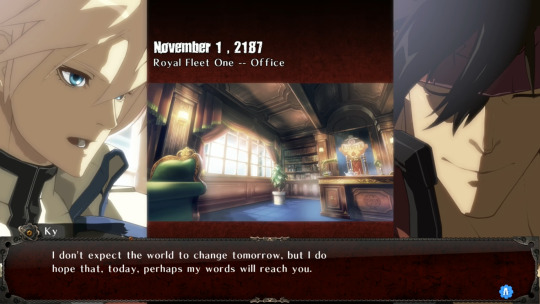
This softness appears later in the convo as well however.
[EN] Ky: I don't expect the world to change tomorrow, but I do hope that, today, perhaps my words will reach you.
Sol... I'll be waiting for you. We'll all be waiting for you. Sin, Dizzy... Once all this is over...come home.
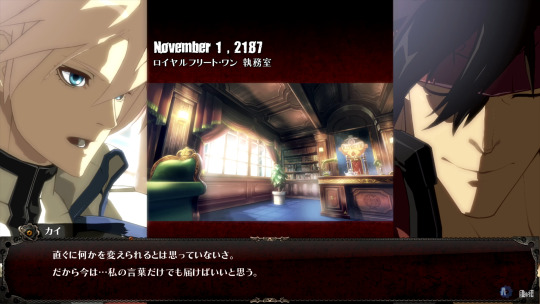
[JP] Ky: I'm not so foolish to think I can change anything overnight. So for now... I hope at least my words will reach you.
Listen, Sol. I'll be waiting for you. Sin and Dizzy too... We will all wait together. Once this is all over, come back to us.
Note again the lack of the world or humanity's tomorrow in the undertone. The meaning is largely retained, and the slight stretch to change "come back to us", to "come home" is valid with the sentiment of a home established back in Overture. I like it. (Also see the OST, Coming Home for the extra emphasis.)
Sol reacts to this with a surprisingly soft laugh.
[EN/JP] Sol: ... You're making me sick. Sure you didn't hit your head or something?
That's the end for now.
I’ve done another Lost In Translation for Revelator/Rev2! Takes a good time to gather materials and put them together lol. There's a sloppily translated bookstart and bookend plot point in that one, and a semi lost foreshadowing for Strive. There’s not much SolKy/KySol on this.
Feel free to take a look!
37 notes
·
View notes